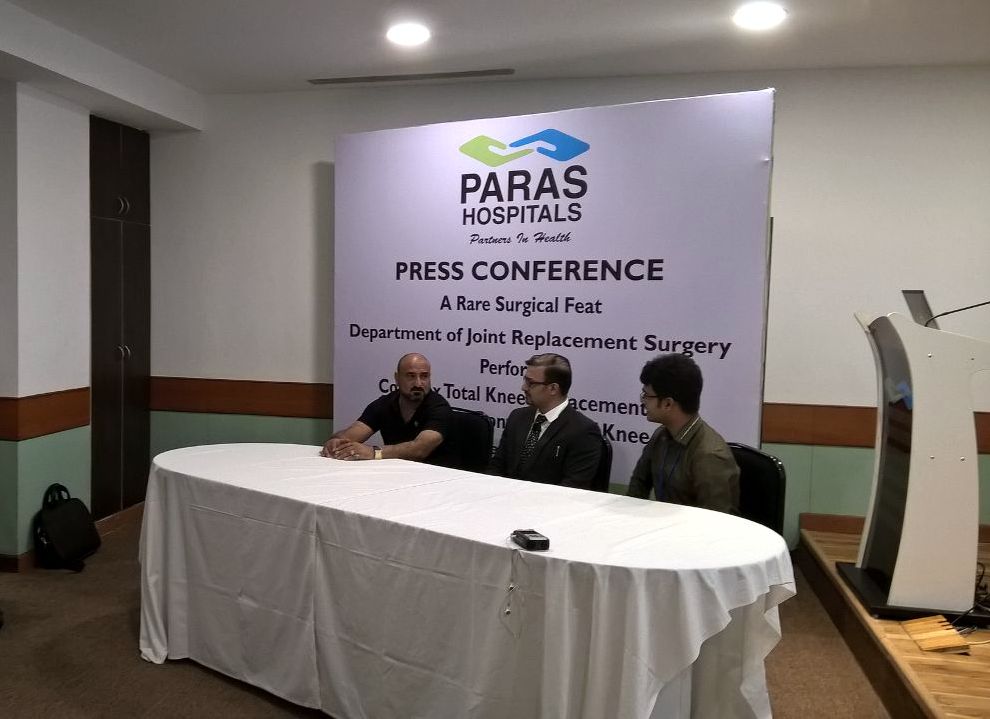 Hameed travelled to India to seek medical help after living in extreme pain & disability for 4 year
Hameed travelled to India to seek medical help after living in extreme pain & disability for 4 year- With a bullet injury and previous surgery resulting in a bony fusion, the 45-year-old man’s knee was bent permanently at 30 degrees
Gurgaon, June 2015: 45-year-old Hameed from Iraq suffered a gunshot wound to his knee four years back following which he underwent a surgery. However, he was rendered significantly disabled with his knee stiff in bent position and zero movement in the lower limb, causing him to live an extremely painful and restricted life.
When no treatment worked, Hameed decided to travel to India to seek medical help, and finally found succor at Paras Hospitals, Gurgaon where he underwent a extremely rare and complex surgical procedure to replace his damaged knee and recreate the knee joint by undoing the complete bony fusion that had rendered him disabled.
After consulting several doctors in India and failing to get a confident chance of recovery, Hameed finally got in touch with Dr Vivek Logani, Chief of Joint Replacement Surgery and his team member Dr Deepak Thakur, Consultant Joint Replacement, at Joint Replacement Centre, Paras Hospitals, Gurgaon.
A thorough examination of his condition revealed that the knee joint of the man had been completely damaged and had caused the thigh bone, the leg bone as well as the patella to completely fuse or join into each other. From a flexible joint capable of motion, this patient’s knee had become a mass of bone incapable of joint-like motion.
“We thoroughly evaluated the patient and found that there was complete bony fusion between femur (thigh bone), tibia (leg bone) and patella (knee cap) in a bent position around 30-40 degrees. There was extensive soft tissue scarring around the knee owing to the gunshot and previous surgery. We decided to undertake a total knee replacement surgery on the patient. However, this was nothing like the knee replacement that surgeons frequently perform. It was a very complex and rare case of a knee that had gone stiff due to fusion of the bones, with muscles and ligaments too suffering major damage. We therefore did extensive planning for a modified skin incision to avoid the scarred area,” said Joint Replacement Centre, Paras Hospitals, Gurgaon.
The surgery was a complex procedure involving large exposure, release of quadriceps muscle which was stuck on the thigh bone, cutting of the imperceptibly fused junctions between knee cap, thigh and leg bone to recreate a joint space at the correct place, meticulous balancing of the ligaments and implanting special artificial knee implants with stem extensions for thigh and leg bones. The surgery was performed with advanced computer navigation technology for enhanced accuracy and surgeons took utmost care to avoid any possible complications during the surgery. At the end of surgery which lasted about three hours, the doctors succeeded in obtaining almost 100 degrees of movement in the knee that was stiff and dysfunctional from the past 4 years.
Such complex knee replacements for complete bony fusion of thigh bone, leg bone, and knee cap are rarely reported even in high volume joint replacement centres across the world and successful outcome is even rarer. Such surgeries involve a high risk of complications, like wound dehiscence, infection, rupture of quadriceps mechanism and ligaments, repeat stiffness, damage to nerves and blood vessels, fractures and so forth. Some of the largest series across the world have reported an average range of motion between 60 to 70 degrees after surgery (assuming straight knee to be zero degrees).
“Fortunately, we observed a very smooth and successful recovery for the patient. The patient was able to sit on chair with knees bent at 90 degrees comfortably the day after surgery. Our rehabilitation chief Dr Wasim along with team of rehabilitation experts worked incessantly to guide the patient to strengthen his quadriceps muscle which is of vital importance for knee function,” said Dr Deepak Thakur, Consultant, Joint Replacement, Paras Hospitals, Gurgaon.
At the end of five days after surgery, the patient was walking well with the help of just a walking cane and had practiced stair climbing as well along with a comfortable pain-free active range of motion from zero to 90 degrees. The surgical site was healthy too.
“The surgery is so complex and rare that majority of joint replacement surgeons may not get opportunity to operate many cases during their lifetime. Such surgeries are technically demanding and represent the top end of the spectrum of challenging joint replacements, and therefore, should be undertaken only by experienced surgeons. I feel, meticulous planning, gentle soft tissue handling and experience can help surgeons avoid many possible complications during such challenging surgeries,” added Dr Logani.
Hameed is overjoyed by his recovery and feels he has got a new lease of life. He can stand on his feet after 4 years, walk and can hope to live a normal life now.

